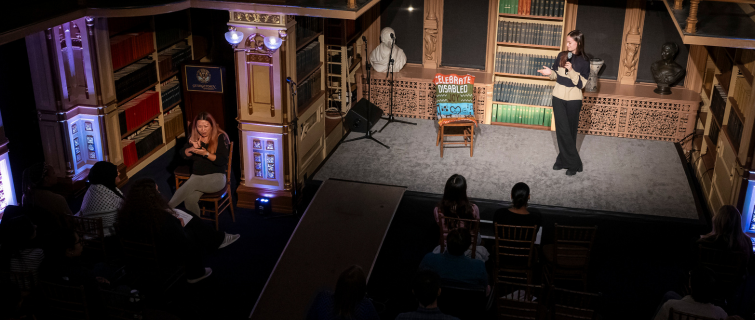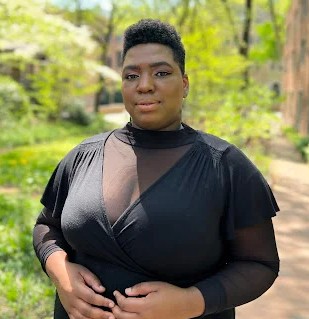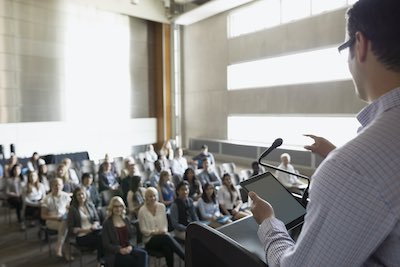
When Monica Kessel was about 7 years old, a doctor told her parents that she might have ADHD. But she was doing well in elementary school, and the staff felt that nothing needed to be done.
“My teachers loved me. I got good grades,” Kessel recalls. “They said, ‘You don’t need to worry about it: It’s fine.’ Because I was within the structure of elementary school, there wasn’t necessarily any way for my ADHD to manifest.”
High school was also manageable, Kessel says. “But then, after getting into college, that structure went out the window,” and she knew something was wrong.
It wasn’t until three weeks before starting the Master’s in Higher Education Administration program at Georgetown University that Kessel received a definitive diagnosis of ADHD. That would be followed two years later by an additional diagnosis of Level 1 Autism Spectrum Disorder.
Learning that she had ADHD gave Kessel insight into what she needed to thrive.
“It has been one of the most helpful things for me because I have been able to request accommodations in my classes,” Kessel says, “and that has largely been a part of my success in grad school, and I have a 3.9 GPA because of it.”
Discovering a Passion

The ADHD diagnosis also sparked Kessel’s interest in neurodivergent disabilities and motivated her to advocate on behalf of all disabled college students, who make up nearly one in five undergraduates in the United States. Her Capstone project, submitted in December 2023, suggests ways Georgetown can continue to strengthen its work helping disabled students feel more welcome on campus.
Her Capstone recognized Georgetown’s efforts to improve the undergraduate experience for disabled students by founding the Disability Cultural Center (DCC), which provides a safe space for disabled students and serves as a model for what a more inclusive campus could look like. Opened in the fall of 2023, it is one of only a handful of such centers in colleges and universities nationwide and the first at a Catholic or Jesuit university.
“Monica’s project is one of the early, pioneer studies to look at these new centers that are, hopefully, going to pop up more in the future,” says Stephanie Kim, Ph.D., faculty director of the Higher Education Administration program. “And my hope is that she can spread this knowledge to other colleges and universities.”
Being ‘Different,’ Feeling Marginalized
Long before her ADHD diagnosis, Kessel knew what it felt like to be different.
“I was already multiply marginalized—being queer, being gender nonconforming, being a Black woman,” she says. “Intersectionality and marginalized communities were always in the forefront of my mind. But, as I started to understand my own disabled identity, I started putting it more into my academics: I started looking at the way disabled students are consistently disenfranchised, and I noticed that there was a lack of research about disabled students.”
Simply put, most colleges are not designed for disabled students: not physically, not pedagogically, not socially, Kessel says. And while they may say they value diversity and inclusion and strive to be welcoming places, they neglect the needs of students who are physically or neurologically nonconforming. And that means that up to one-fifth of their undergraduate population might feel isolated and be unable to take advantage of all college has to offer.
Celebrating Disability
For her research, Kessel spoke at length with four Georgetown undergraduates with disabilities, who contrasted their general campus experiences with events sponsored by the Disability Cultural Center. The center, according to its mission statement, celebrates disability “through the transformative power of the arts, sciences, and community,” and it calls on Georgetown, in keeping with its embrace of such values as Community in Diversity and Educating the Whole Person, “to foster a culture of access inside and outside of the classroom that embraces non-apparent and apparent disabilities as vital to the vibrant diversity of humanity.”
“It’s part of the work of the Disability Cultural Center to shift the cultural climate and understanding of disability into one of disability gain,” says Amy Kenny, Ph.D., the center’s director and author of the award-winning book, “My Body is Not a Prayer Request.” “Our disabled students contribute to our community and are vital parts of the Georgetown community. So, making sure that our events can provide a culture of access so that our disabled students fully belong is so important for all of our flourishing.”
Kessel’s research shows that the DCC is succeeding in celebrating the “vibrant diversity of humanity.” And that starts by considering the needs of all Georgetown students.
In society at large and at universities nationwide, accommodations for extra-curricular activities must often be requested by the student. This can compel disabled students to “out” themselves, which can be unsettling to those with autism and other neurodivergent conditions, who may not want to be identified.
Her research found that DCC events reduced emotional barriers, enhanced disability identity formation, fostered a sense of belonging, and allowed students to experience community. “Going to DCC events,” Kessel writes, “where their needs were met as a matter of expectation, and not a ‘special request,’ made the students feel included.”
Putting Her Skills To Work
Kessel now applies her knowledge and skills to her job as an events and reservations coordinator at the University of Pennsylvania. Her Capstone lists eight recommendations for colleges, some of which cost little —or nothing: things like incorporating more intermissions or breaks into events;, asking speakers to include a visual description of themselves in their introductions to help visually impaired students; welcoming the use of stim tools (objects that provide sensory stimulation that helps people with sensory issues focus and relax) at events and creating an environment where students are not singled out in using them; and collaborating with the disability community on your campus.
Creating this kind of campus not only helps disabled students—it benefits able-bodied students whose lives are enriched by the unique contributions that disabled students bring to a campus.
“I think one of the reasons why disabled people are uniquely creative is because we live in a world that isn’t built for our bodies and minds,” Kenny says. “So, we innovate and create every day to make the world accessible to us.”
